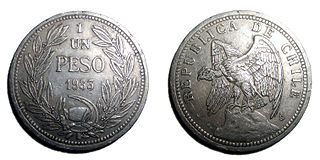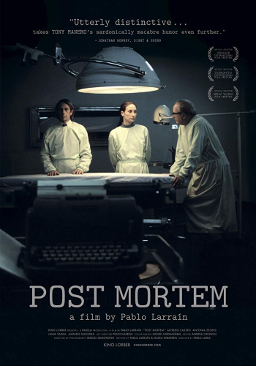
The Chicago Boys were a group of Chilean economists prominent around the 1970s and 1980s, the majority of whom were educated at the Department of Economics of the University of Chicago under Larry Sjaastad, Milton Friedman, and Arnold Harberger, or at its affiliate in the economics department at the Pontifical Catholic University of Chile. After they finished their studies and returned to Latin America, they adopted positions in numerous South American governments including the military dictatorship of Chile (1973–1990), as economic advisors. Many of them reached the highest positions within those governments. Ronald Reagan and Margaret Thatcher were influenced by Chile's policies and economic reforms.
Neoliberalism is both a political philosophy and a term used to signify the late-20th-century political reappearance of 19th-century ideas associated with free-market capitalism. The term has multiple, competing definitions, and is often used pejoratively. In scholarly use, the term is often left undefined or used to describe a multitude of phenomena; however, it is primarily employed to delineate the societal transformation resulting from market-based reforms.

The "Miracle of Chile" was a term used by economist Milton Friedman to describe the reorientation of the Chilean economy in the 1980s and the effects of the economic policies applied by a large group of Chilean economists who collectively came to be known as the Chicago Boys, having studied at the University of Chicago where Friedman taught. He said the "Chilean economy did very well, but more importantly, in the end the central government, the military junta, was replaced by a democratic society. So the really important thing about the Chilean business is that free markets did work their way in bringing about a free society." The junta to which Friedman refers was a military government that came to power in a 1973 coup d'état, which came to an end in 1990 after a democratic 1988 plebiscite removed Augusto Pinochet from the presidency.

An authoritarian military dictatorship ruled Chile for seventeen years, between 11 September 1973 and 11 March 1990. The dictatorship was established after the democratically elected socialist government of Salvador Allende was overthrown in a coup d'état backed by the United States on 11 September 1973. During this time, the country was ruled by a military junta headed by General Augusto Pinochet. The military used the breakdown of democracy and the economic crisis that took place during Allende's presidency to justify its seizure of power. The dictatorship presented its mission as a "national reconstruction". The coup was the result of multiple forces, including pressure from conservative groups, certain political parties, union strikes and other domestic unrest, as well as international factors.
Arnold Carl Harberger is an American economist. His approach to the teaching and practice of economics is to emphasize the use of analytical tools that are directly applicable to real-world issues. His influence on academic economics is reflected in part by the widespread use of the term "Harberger triangle" to refer to the standard graphical depiction of the efficiency cost of distortions of competitive equilibrium.

The Havana Film Festival is a Cuban festival that focuses on the promotion of Latin American filmmakers. It is also known in Spanish as Festival Internacional del Nuevo Cine Latinoamericano de La Habana, and in English as International Festival of New Latin American Cinema of Havana. It takes place every year during December in the city of Havana, Cuba.

Hernán Alberto Büchi Buc is a Chilean economist who served as minister of finance of the Pinochet government. In 1989 he ran unsuccessfully for president with support of Chilean right-wing parties.

Juan Martín Cueva Armijos is an Ecuadorian documentary film director and the director of the Filmfestival "Cero Latitud" in Quito. His documentary film "Where the poles meet" won the Best Documentary at the IX Festival Internacional de Cine de Valdivia in Chile and at the Brouillon d’un reve de la Scam in Paris in 1999.

Chilean cinema refers to all films produced in Chile or made by Chileans. It had its origins at the start of the 20th century with the first Chilean film screening in 1902 and the first Chilean feature film appearing in 1910. The oldest surviving feature is El Húsar de la Muerte (1925), and the last silent film was Patrullas de Avanzada (1931). The Chilean film industry struggled in the late 1940s and in the 1950s, despite some box-office successes such as El Diamante de Maharajá. The 1960s saw the development of the "New Chilean Cinema", with films like Three Sad Tigers (1968), Jackal of Nahueltoro (1969) and Valparaíso mi amor (1969). After the 1973 military coup, film production was low, with many filmmakers working in exile. It increased after the end of the Pinochet regime in 1989, with occasional critical and/or popular successes such as Johnny cien pesos (1993), Historias de Fútbol (1997) and Gringuito (1998).

Pablo Larraín Matte is a Chilean filmmaker. He is known for directing films such as No (2012), Neruda (2016), Jackie (2016), Spencer (2021), El Conde (2023), and Maria (2024). Larraín and his brother Juan de Dios co-produced Sebastián Lelio's A Fantastic Woman (2017), which was the first Chilean film to win the Academy Award for Best Foreign Language Film. In 2021, Larrain directed the Apple TV+ psychological romance horror miniseries Lisey's Story.

Post Mortem is a 2010 Chilean drama film directed by Pablo Larraín and set during the 1973 military coup that overthrew former President Salvador Allende, inaugurating the 17-year dictatorship of Augusto Pinochet. The film competed in the 67th Venice International Film Festival, Antofagasta Film Festival, Havana Film Festival and the Guadalajara International Film Festival. The film's main character Mario Cornejo is based on a real person with the same name.
The Santiago International Film Festival is a film festival that launched in 2005. As its name suggests, the festival takes place in Santiago, Chile.
Sebastián Sepúlveda is a Chilean screenwriter, film producer, editor and director.

The Viña del Mar International Film Festival is a Latin American film festival held annually in Viña del Mar, Chile.
Elisabetta Perut Bozzolo is a Chilean journalist, film director, producer, and screenwriter best known for the documentaries Un hombre aparte and La muerte de Pinochet. Both of these were made in collaboration with Iván Osnovikoff, a director with whom she has done most of her audiovisual work in the documentary field.

Chameleon is a 2016 Chilean psychological thriller film written and directed by Jorge Riquelme Serrano. It had its world premiere at the 2016 BFI London Film Festival where it was selected to compete for the Sutherland Award.

Rara is a 2016 Chilean-Argentine coming-of-age comedy film directed by Pepa San Martín, written by Alicia Scherson, and starring Julia Lübbert and Mariana Loyola. It is the first feature film produced by Manufactura de Películas, based in Santiago, and co-produced by Le Tiro Cine, from Buenos Aires.

Rolf Lüders Schwarzenberg is a Chilean economist, entrepreneur, scholar, politician, and former Minister of State of the military dictatorship of Augusto Pinochet. He is son of Jürgen Lüders, leading mountaineer of the Club Alemán Andino.
The Alamos Alliance is a lobbying organization consisting of a group of conservative economists linked to the Chicago Boys, which holds a three-day annual meeting, usually by mid-February, in a town named Álamos, in the Mexican state of Sonora, in northwestern Mexico.












